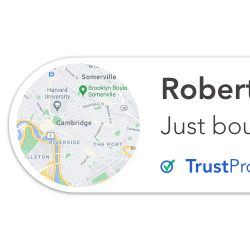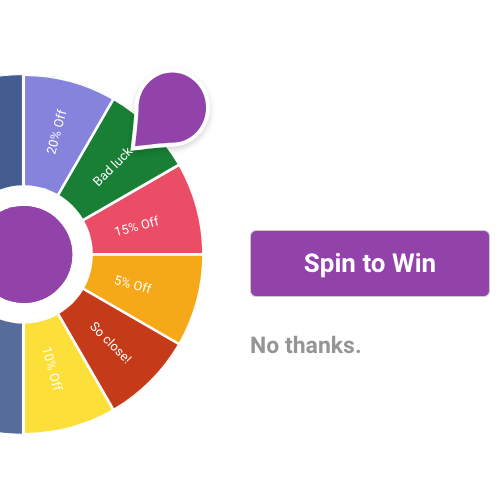The world’s biggest brands use Social Proof throughout their marketing. At the same time, eCommerce giants (like Amazon) display customer feedback for every product they sell. Fake Social Proof apps and phoney reviews help new businesses hack this system by creating the appearance of popularity. However, whilst this may seem like a low-cost way to speed-up business growth, it’s an accident waiting to happen.
How Fake Social Proof Could Destroy Your Business
- What is Fake Social Proof?
- Six Reasons To Avoid Fake Social Proof
- How To Add Real, Automatic Social Proof To Your Website
- Conclusion
On 16 October 2019, a cyber-security researcher named Ophir Harpaz was searching for a cheap flight to London. Whilst browsing the OneTravel website, she noticed a countdown timer attached to one of the options with a notification: “38 people are looking at this flight.” Feeling skeptical, Harpaz inspected the source code.

The element that produced the notification was labelled “view_notification_random”. Digging further into the code, Harpaz found a simple piece of javascript designed to display a random number. Not only had OneTravel invented 38 people, they were using the number to put pressure on customers.
Harpaz tweeted her discovery, prompting thousands of retweets and calls for “dark patterns” to be regulated by law. However, despite this kind of public scandal, fake Social Proof is an increasingly common marketing strategy. Most businesses remain unaware of the risks it poses to their brand. More surprising, many people don’t realise how easy it is to use real Social Proof.
Social Proof is an effect that occurs when something seems particularly popular. It leads us to trust well-known products and aspire to fashionable brands, without being conscious of the association. Sometimes, the effect is triggered by positive customer reviews or star ratings. Other times, it is incorporated into advertising campaigns and other forms of Social Proof marketing. It is one of the ways an online business can differentiate themselves and encourage people to buy.
Fake Social Proof imitates the popularity that well-known brands have built up over time. Like real Social Proof, it can be shown in a number of forms. Most common are fake sales notifications, phoney reviews and computer-generated “likes”. The problem with this strategy is that it undermines the trust and prestige it is intended to create.
The consequences of being exposed as a Social Proof faker can vary. Some forms of fake Social Proof simply result in lost sales, with 54% of customers saying they would never buy a product if they suspected its reviews were fake. Other times, the effects can be more dramatic. This article will show you what happens when fake Social Proof goes wrong.
According to Business Insider, influencer marketing is worth around $8 billion annually. That figure is expected to rise to over $15 billion within the next two years, with some businesses earning as much as $5.20 for every $1 they spend on a campaign. However, for many, the very concept of influencer marketing pushes the boundaries of real Social Proof. Although Social Media influencers are required by law to signpost promotional content, the posts themselves are designed to look real.

In November 2015, Volvo launched an influencer marketing campaign featuring the lifestyle blogger Chriselle Lim. Lim published a series of Instagram posts based on Volvo’s new eco-friendly car range. Within minutes, her posts received a flood of comments criticising both her and the company. Despite being flagged as promotional content, the campaign’s message contrasted with Lim’s persona. For her followers, this discontinuity broke the personal connection they felt with her. For other Instagram users, Lim’s sudden endorsement of an environmentally-friendly product felt hypocritical.
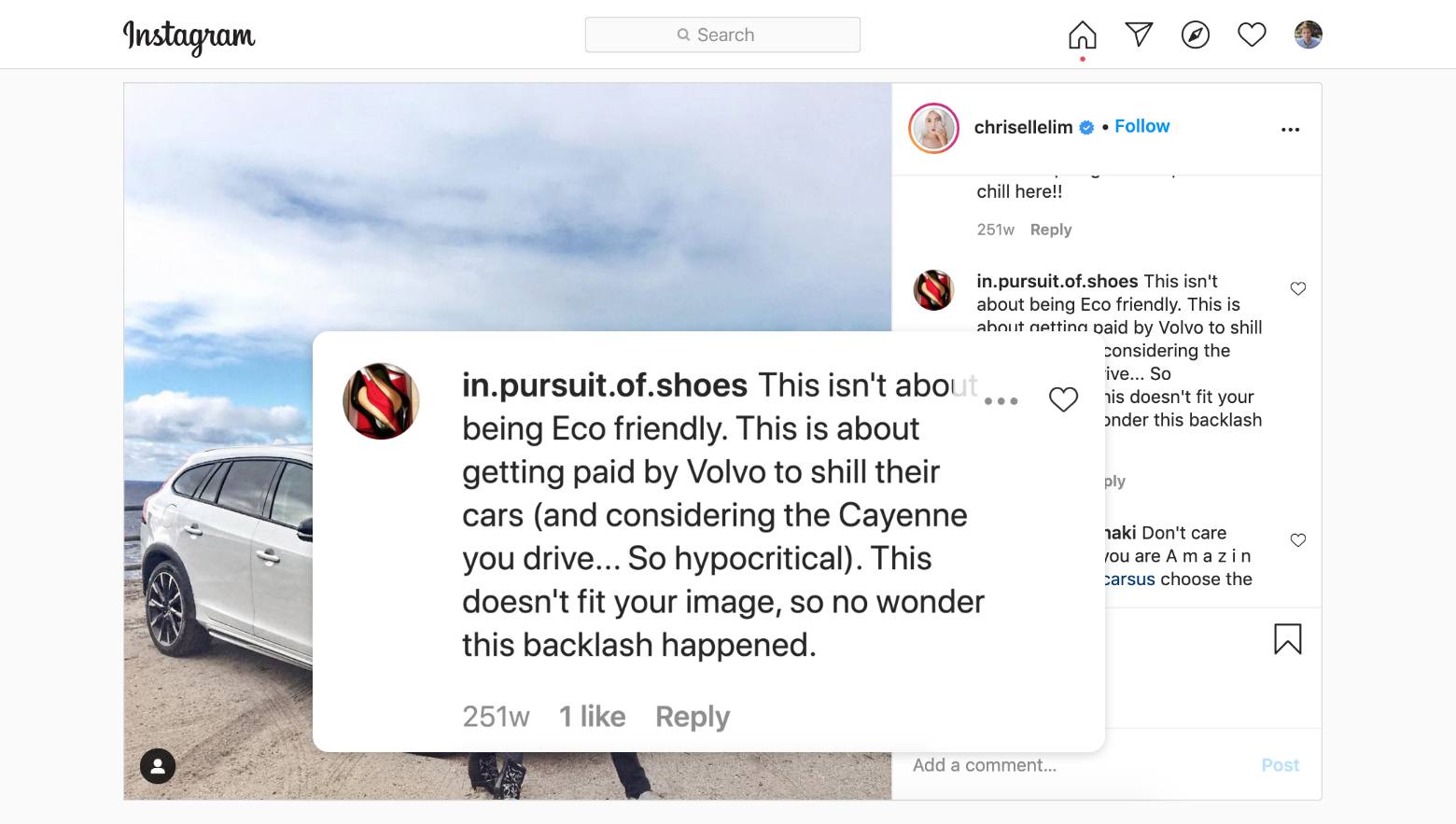
Despite the publicity that it generated, neither Lim nor Volvo suffered any long-term consequences as a result of the campaign. More brazen forms of fake Social Proof have destroyed careers, brands and entire industries.
Creating Social Proof With Imaginary Influencers
In 2017, the marketing agency Mediakix organised a PR stunt to highlight a scam that was undermining their industry. To demonstrate the extent of fraud within social media marketing, the agency created two fake influencer profiles using stock photographs. The fictional influencers, “Amanda Smith” and “Alex Rae”, were given the Instagram handles wanderinggirl and calibeachgirl310. Not only were they fake, but Mediakix also purchased thousands of followers for each account. According to the agency, they were able to add up to 15,000 followers each day, paying between $3 and $8 for each 1000 followers.
We paid around 12 cents per comment, and between $4-9 per 1,000 likes. On the lower end of that price range, it took around 24 hours for the likes to appear, whereas, on the higher end of that price range, likes were delivered instantly.
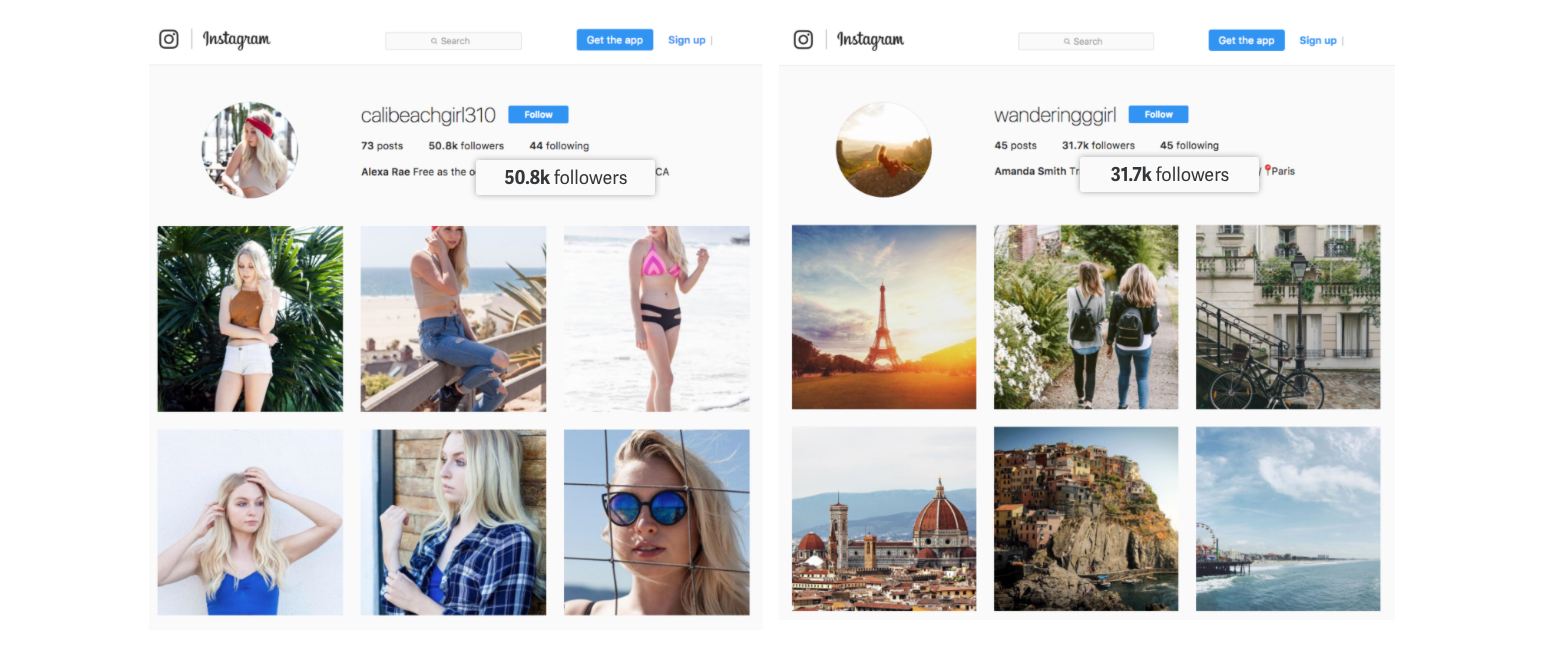
The agency had imagined that the fake accounts would be identified quickly, and that the stunt would increase public awareness of online fakery. Instead, what happened took them by surprise: both accounts were identified by marketing teams and invited to create sponsored posts. Within weeks, both characters had secured at least two paid brand endorsements. Despite neither the accounts nor their followers having a real-world presence, Instagram had two new paid influencers.
Unknown to the PR team at MediaKix, the practice of purchasing social media followers went well beyond the sphere of influencer marketing. In fact, they had only scratched the surface. Just a few months after the MediaKix campaign was publicised, the New York Times ran an article about a mysterious company named Devumi.
“Like Farming” And Fake Followes
Devumi was a marketing agency with a database of over 3 million cloned social media accounts. In January 2018, the New York Times uncovered a network of over 200,000 celebrities and public figures who had purchased fake Twitter and Facebook followers from them. One of the company’s clients, an eCommerce entrepreneur named Martha Lane Fox, purchased 25,000 followers from the company just days after becoming a Twitter board member. Following the publication of the article, the company was legally prosecuted in the US and fined over $2.5 million. Its clients, meanwhile, offered grovelling public apologies.
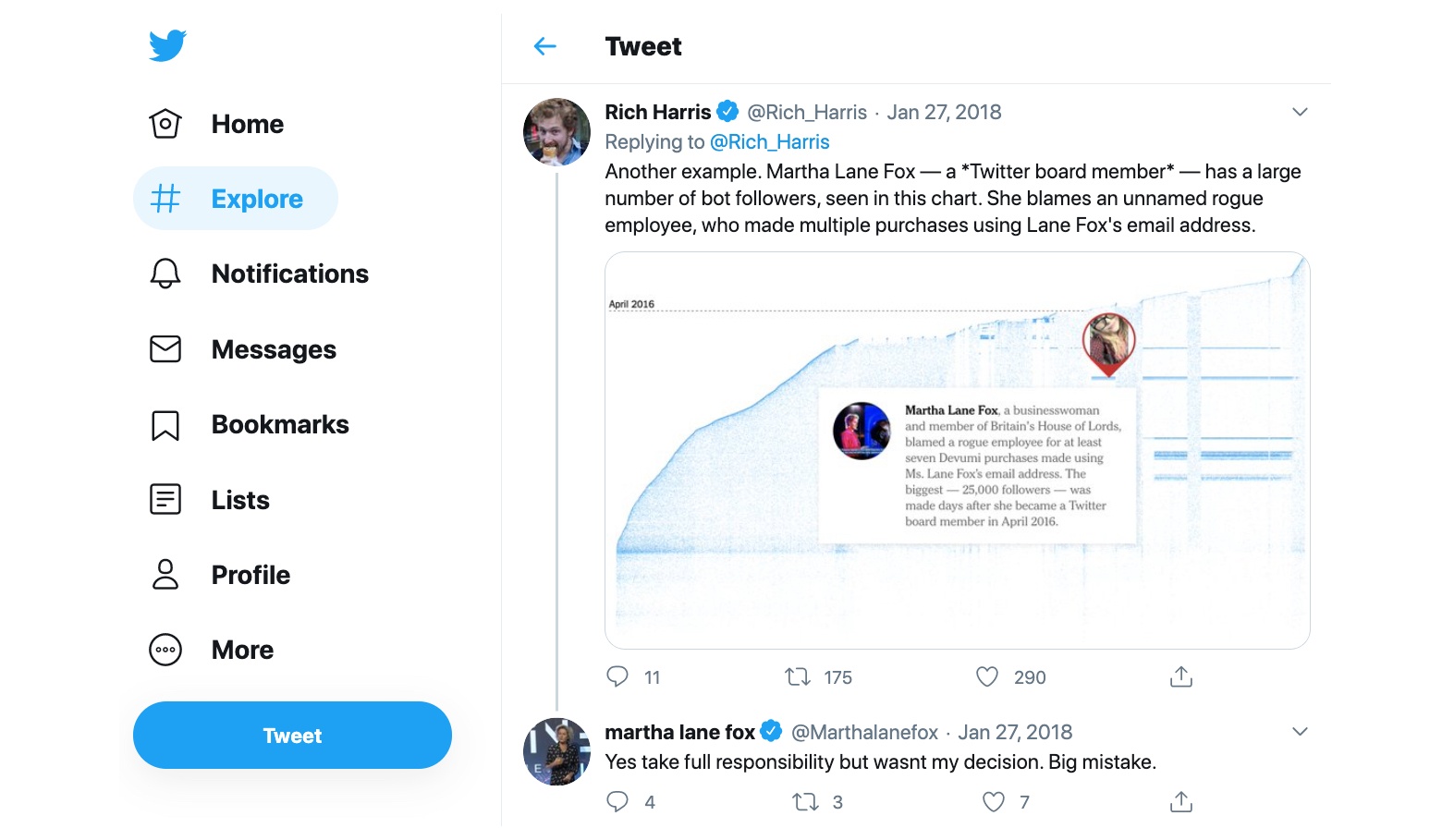
Although neither Volvo nor the clients who purchased fake Twitter followers from Devumi received substantial fines, they suffered significant damage to their brands and reputations. The consequences can be much more severe. Following the 2019 revelation that she had purchased thousands of Instagram followers, the lifestyle blogger Caroline Calloway received an intense media backlash. She was forced to radically transform her account and find a new way to monetise her fame.
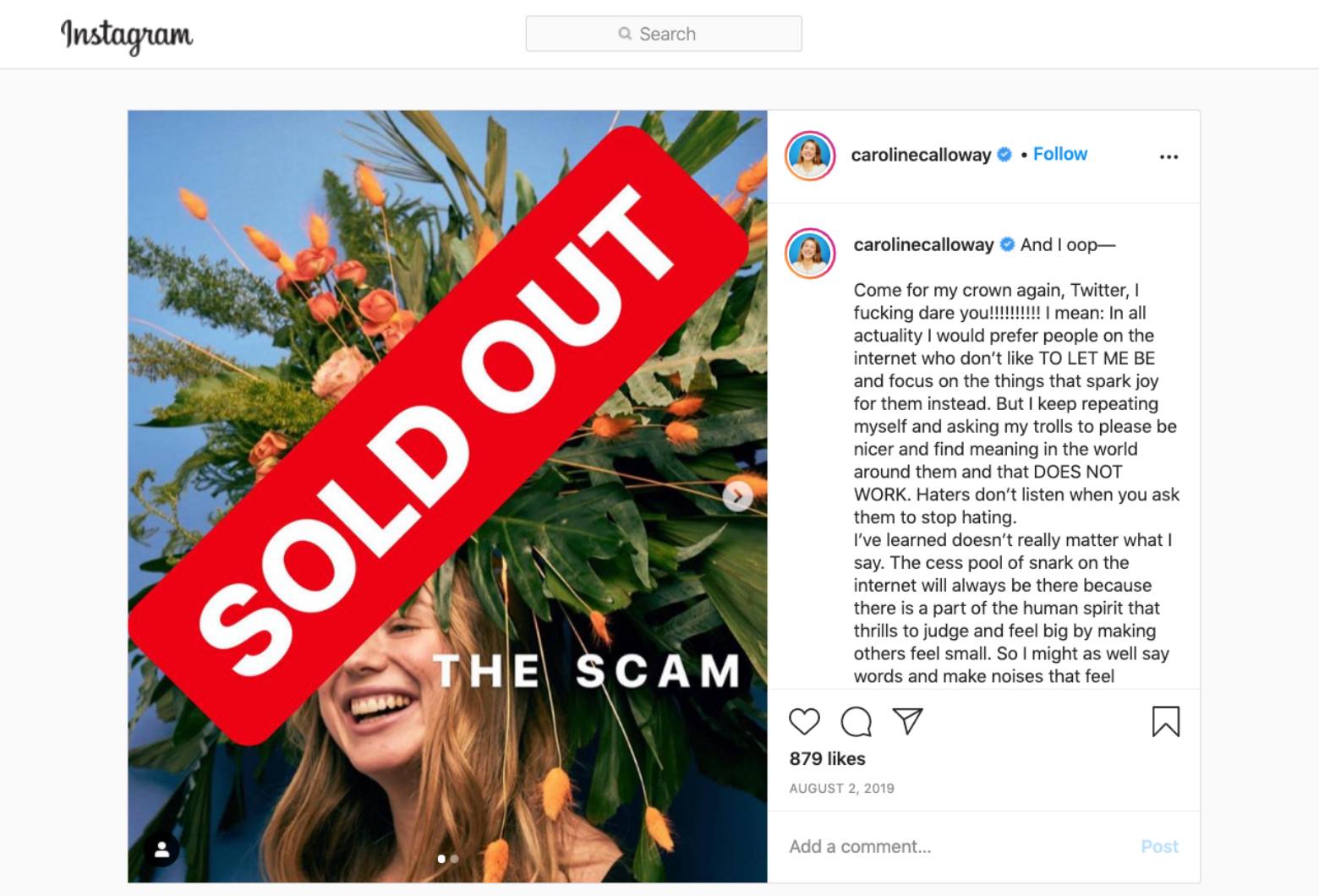
One disastrous tour of “creativity workshops” and one abandoned book deal later, Calloway is still rebuilding a new public profile as a self-confessed “Scammer”.
According to a survey by BrightLocal, the average consumer spends over 13 minutes reading reviews before they make a purchase. Alongside that, they will need to read at least 10 reviews before they feel they can trust a business. Because customer reviews have such a significant effect on online sales, a number of online brands have resorted to buying fake reviews.
A recent investigation by the consumer welfare agency Which found thousands of fake reviews for Amazon products across a range of categories. For headphones alone, Which was able to identify over 10,000 fake reviews for 24 different products. The agency also explored the reviews for the top 10 ranked hotels on TripAdvisor at a number of popular tourist destinations. This second investigation suggested that one in seven hotels were deliberately showing fake reviews.

Most of these artificially generated reviews were easily identified. The computer-generated content used repetitive, formulaic sentences and were submitted in distinct batches. However, some businesses use subtler methods to inflate their ratings and create fake Social Proof. Unfortunately, the use of incentives and coercion to influence customer feedback is much more difficult to detect.
Real Customers, Fake Reviews
In October 2019, a former employee of the cosmetics brand Sunday Riley published a post on reddit describing unique corporate strategy. Before each product launch, the company instructed its junior staff to post reviews of its products on Sephora. Both Sunday Riley herself, and the chief marketing officer, were involved in writing the instructions to junior staff members.
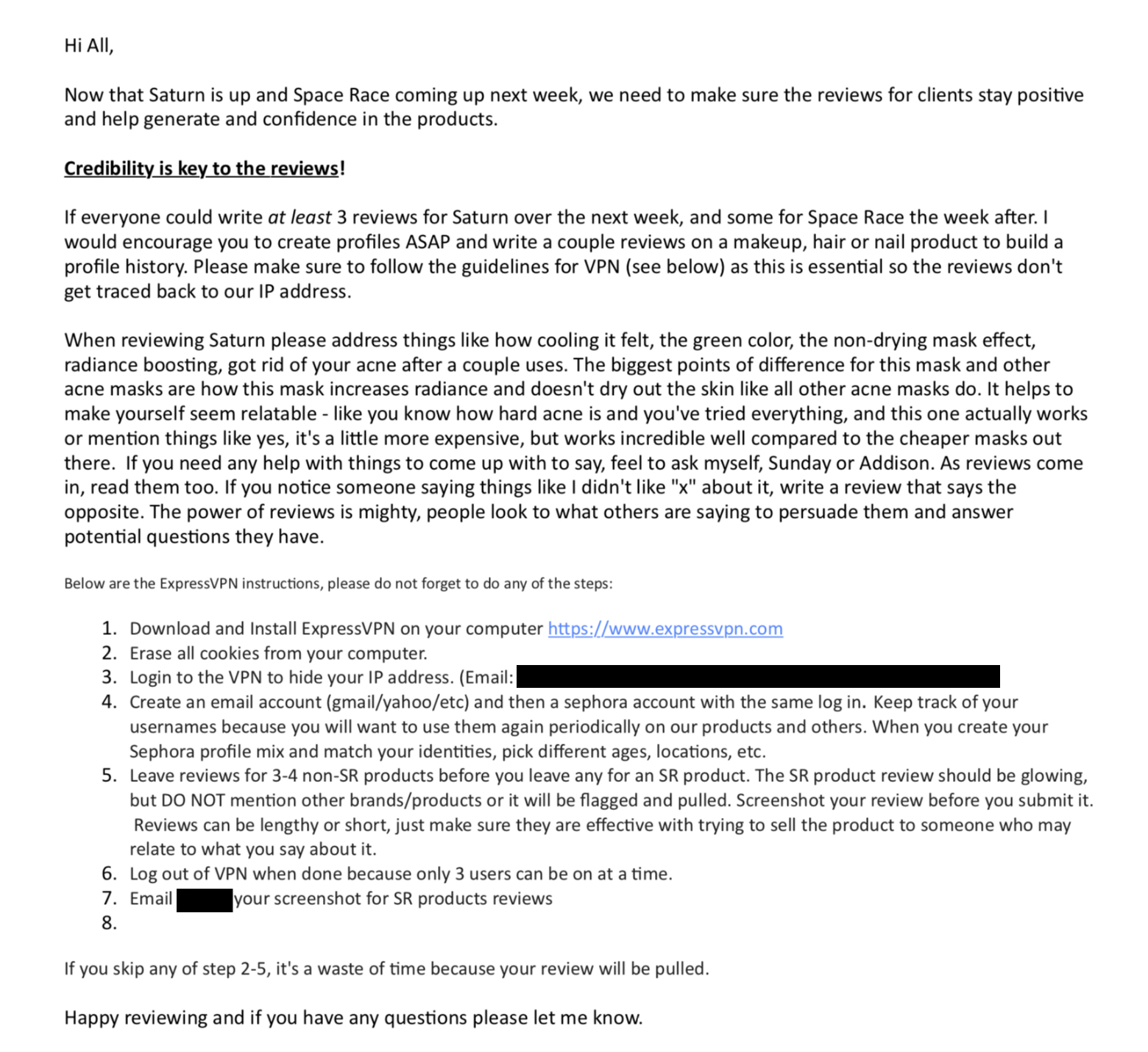
The instructions detail a sophisticated procedure for avoiding the filters that Sephora uses to prevent fake reviews. For example, staff members were instructed to install a specific VPN, create profiles with a range of ages and locations, and post a series of reviews over the course of a week. Following an investigations by the Federal Trade Commission, it was established that the scheme had been in place for over two years:
As detailed in the Commission’s complaint, Sunday Riley and other senior managers were acutely focused on boosting their products’ ratings at the expense of competitors. For example, Ms. Riley personally complained that the 4.2 rating on two of her products was too low, and instructed her employees that she’d “like to see them at 4.8+.”
– Federal Trade Commission Statement, 21 October 2019
Aside from the immediate damage to its brand, the company is likely to feel the consequences of the scandal for years to come.
The Risk Of Using Fake Reviews
As part of the BrightLocal survey on customer reviews, participants were asked if they had noticed a fake review in the past year. When the survey was first conducted in 2018, a third (33%) of those interviewed said they had noticed a fake review. By 2019, that number had risen to almost half (46%) of participants. This suggests two things: firstly, fake reviews are becoming more common. Secondly, it shows that consumers are getting better at spotting them.
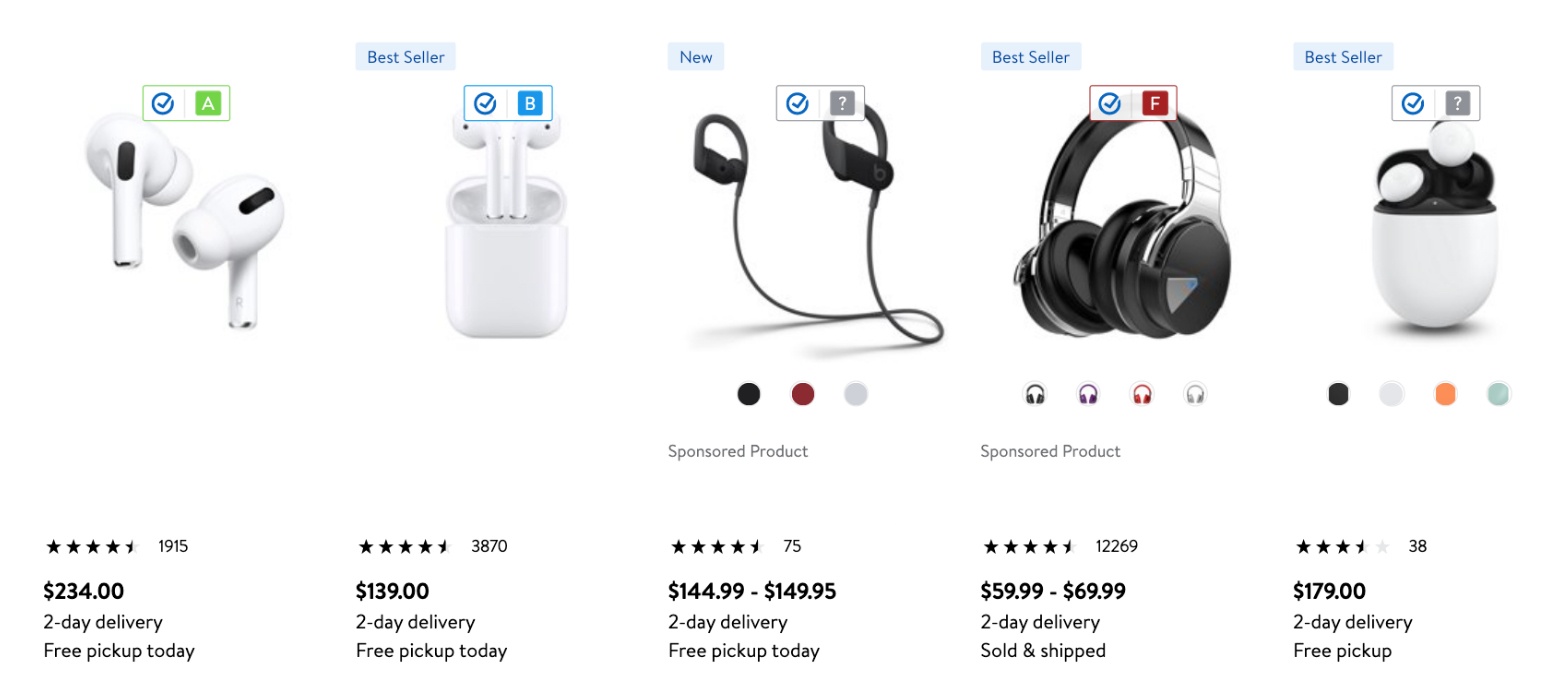
In addition to this improvement in online consumer literacy, new tools are helping browsers distinguish between real and fake Social proof. The Chrome extension Fakespot, for example, allows its users to inspect product pages on Amazon, eBay or Sephora. Other users can then see the results in real-time, with on-page authenticity ratings from A-F.
Whilst Sunday Riley did not receive a financial penalty from the FTC, the scandal has had an enormous impact on the brand. Following the publication of the whistleblower article in October 2018, the company was forced to purchase paid ads in the US for the first time.

For months after the scandal, search engine results for “Sunday Riley” and “Sunday Riley reviews” returned significant volumes of negative publicity. Google searches for “Sunday Riley reviews” peaked in the US with the publication of the whistleblower’s article in October 2018. They peaked again in October 2019, when the results from the FTC commission were published.

The most striking cost of the reviews scandal for Sunday Riley is the consumer response. In January 2020, the company reduced the price of its well-known Good Genes acid treatment, costing the company a substantial amount. When consumers were asked if they would buy from the brand again, following an article in Cosmopolitan magazine, 67% said “no”.
Whilst some websites develop their own fake notifications (as with the OneTravel “view_notification_random” variable), others use plugins that create fake Social Proof. These plugins imitate real Social Proof apps, appearing to give information about recent sales and page views. However, in the case of apps like Herd Effects and Trust Activity, the data they display is imaginary.
The WordPress app store contains a number of plugins designed to imitate real Social Proof notifications. In our survey of the 14 most popular WordPress Social Proof apps, only 9 made it impossible to create fake notifications. Worse than this, repeated investigations have shown how support staff for small web notification providers advise customers to use dummy data.
This kind of counterfeit Social Proof makes it hard for consumers to trust the information they see online. It is also a problem for businesses who want to display real data about their most popular products. However, it is the businesses who install one of these unscrupulous plugins who have the most to lose.
The Problem With Using Fake Social Proof Apps
In June 2018, Shopify store owners using a particular app received an email from the platform’s managers telling them to uninstall it. The app in question, a popular Shopify Social Proof solution called “Beeketing,” had been removed from the platform as a result of violating the platform’s Partner Program Agreement. Part of the problem was that it enabled its users to behave in a way that contradicted the Acceptable Use Policy . Shopify has strict warnings against the use of “malicious or deceptive practices.”
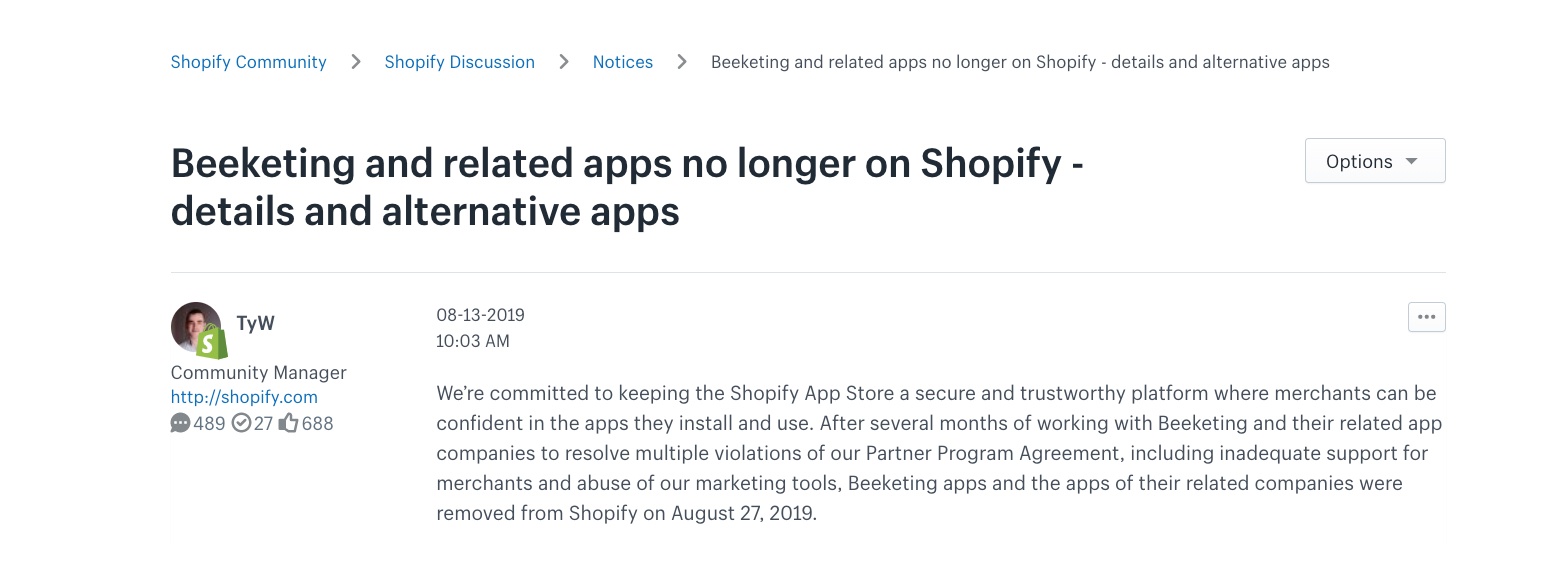
The intervention was part of a general move to prevent store owners from attempting dishonest marketing. Even though Beeketing did not present itself as a fake Social Proof app, it allowed customers to inflate their perceived sales using custom data. Because customers were not able to trust the information they were seeing, Shopify was concerned that confidence in its vendors would suffer.
What Happens When You Use Fake Social Proof Notifications
Just like fake influencers, dark patterns and phoney reviews, fake Social Proof notifications provoke a strong reaction. In the case of Beeketing’s Shopify app, it’s possible that this effect was already taking place. An investigation by LittleData in August 2019 compared conversion rates for just under 1000 Shopify stores with and without Beeketing’s apps. Remarkably, in July of that year, the median conversion rate for stores who used the apps was 0.2% lower than those who didn’t. Compared to the uplift regularly produced by real Social Proof apps, this suggests a lack of trust in the notifications.
In the case of OneTravel and other booking websites, the long-term consequences of fake Social Proof are likely to be severe and irreversible. A recent study by the airline data firm OAG suggests an increasing number of frequent flyers are using search engines rather than comparison websites. The combination of high-pressure selling and low trust has driven users away from platforms that use fake Social Proof. The effect of this change is invisible to the sites themselves, so they are unlikely to notice until their traffic begins to decline.
For most people, creating content to mislead customers is contrary to their moral instincts. Regardless of how competitive the world of eCommerce becomes, most businesses have a strong desire to give their customers a great service. However, even without this ethical motivation, there are some obvious reasons to steer clear of fake Social Proof. These are six things to remember if you’re ever tempted by the world of “black-hat” design.
The research conducted by LittleData in August 2019 demonstrated a fact that most store owners already knew or suspected: for Social Proof to work, customers really have to believe it. The organisation studied 115 stores with Beeketing apps installed, and 884 stores without them. The results suggested very little difference in the conversion rate or add-to-cart rate for the two groups. Even so, the median conversion rate for Beeketing stores was slightly lower (1.4% as opposed to 1.6%). This study highlights the paradox of fake Social Proof notifications. Anything that makes a customer doubt your honesty is likely to harm your sales and your long-term revenue.
Social Proof is most effective when it’s used to improve customer experiences. For example, eCommerce platforms like Amazon use reviews and popularity to help customers navigate different options. The platform also uses popular combinations to recommend up-sells that consumers will really appreciate. In both cases, real Social Proof improves user experience, rather than pressuring browsers into making a purchase.
Similarly, most websites use some form of Social Proof to reduce consumer anxiety. Online shopping comes with uncertainties that can prevent people from ever making a purchase. One of the most effective ways to reassure them is to show that your website is trustworthy. Customer reviews and ratings, social media engagement and popularity all help to build trust. By contrast, any form of Social Proof that appears fake will significantly increase anxiety.
In 2012 Google introduced an update to its ranking algorithm. The adjustment, commonly named the “Penguin” update, introduced penalties for websites with large volumes of low-quality backlinks. Over night, websites built on cheap backlink schemes saw their traffic cut in half.

Penguin penalties affected businesses in more substantial ways than simply reducing traffic. The incident damaged their reputations, and they were forced to spend months catching up with more transparent competitors. If a ranking site or search engine introduces penalties for low-quality reviews, it is likely to produce the same effect. Those businesses whose reputation is built on fake followers and “like farming” will be hit hard.
Despite the pressure marketers face to increase conversions and overall sales, it may not be that useful in the long-term. Every customer who makes a purchase enters a new lead category; your re-marketing funnel. Many businesses spend more trying to re-engage existing customers than they do reaching new prospects. That means there is a good reason to make sure you only target customers who will really benefit from your service. The best way to do that is with real Social Proof.
A recent Trustpilot survey found that 62% of customers would stop using a review platform if they believed it was allowing businesses to censor reviews. Similarly, 70% of global consumers say that the practice of censoring reviews is a serious concern. Not only do customers want to know what your reviews say; they want to know how you collected them.
If you’ve ever received an email offering you something in return for a good review, you’ll know how quickly it changes your perceptions. Realising that your business’s Social Proof is fake could cost you both new and existing customers.
Not only is real Social Proof safer and more effective than “black hat” techniques, it’s also easier. Reviews lose their value quickly, and fake content that isn’t updated (or that changes too frequently) creates suspicion. So, if you want to use fake Social Proof, you’ll have to put a lot of effort into making it look realistic.
There are also significant SEO benefits to using real Social Proof. For example, real user feedback is likely to contain much more specific search terms. When real customers contribute to your web content, you get a steady stream of highly targeted new material without spending any time or effort on it. In other words, your customer are your best copywriters. All this improves your rankings and your page quality (lowering your CPC) and helps you target exactly the right kind of visitor.
Choosing the best reviews platform for your business is an important decision. Switching between platforms is difficult, and it is usually best to build your strategy around a single account. Fortunately, the best and most-trusted review platforms offer free listings. It’s important to pick a trusted name because people will be willing to submit reviews and more likely to trust the ones they see.
Setting Up Your Reviews Platform For Free
Trustpilot is a well-known and trusted platform that makes it easy to collect and show reviews. Signing up for the free account gives you several types of on-page widgets, a company page and 100 automatic emails each month. Because the platform integrates with all the major CMS platforms, you can add it to your business website easily. Unfortunately, upgrading to a paid plan can be quite expensive.
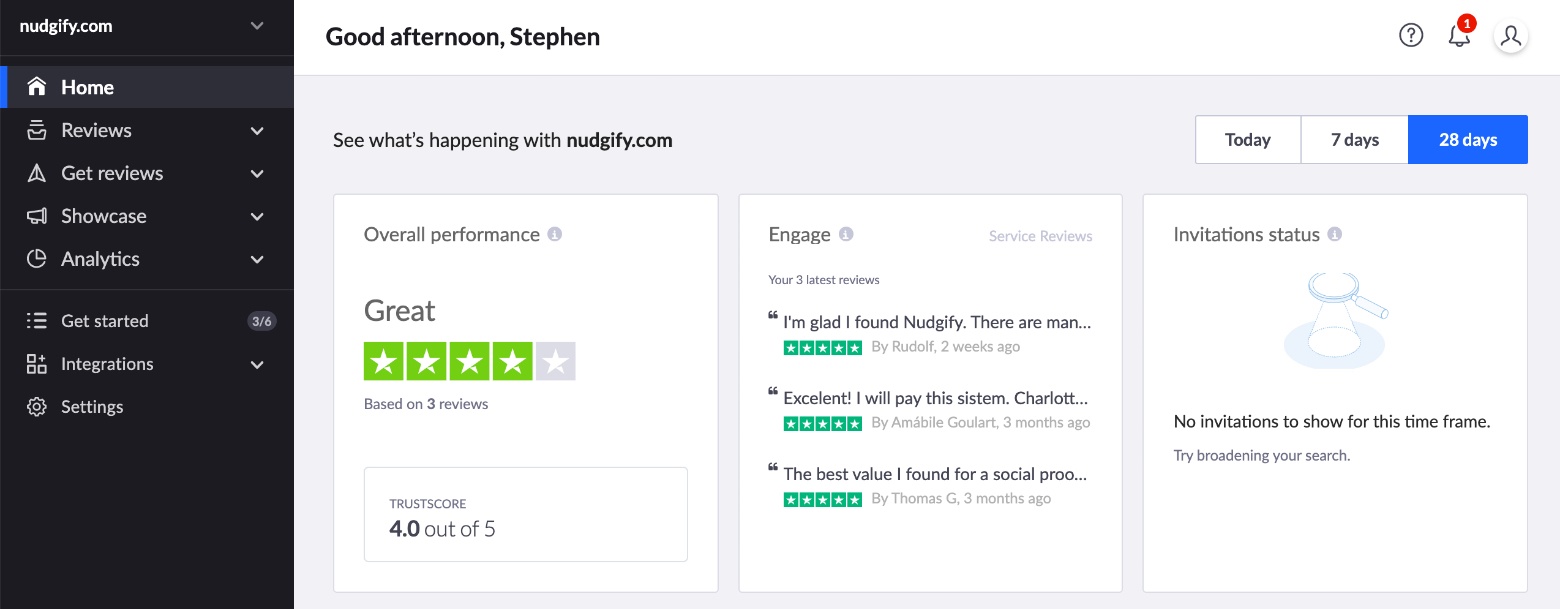
Google My Business is an alternative platform, that also gives you a unique URL for your business. It is more complicated to manage your reviews and there are fewer options for displaying them on your website, but the reviews are displayed in SERP results. That means you get a bigger SEO boost from a thriving Google Business account than you would from Trustpilot.
Displaying Social Proof Notifications That Customers Will Appreciate
There are a vast number of Social Proof apps available, and it can be hard to know which of them will improve your web content. Our comparison of the best Social Proof apps for Shopify and the best WordPress Social Proof plugins compare the pricing, features and trustworthiness of the biggest names on each platform. Nudgify is unique because it provides Social Proof, FOMO and Friction (UX) notifications. Each one of them is designed to improve your customer experience.
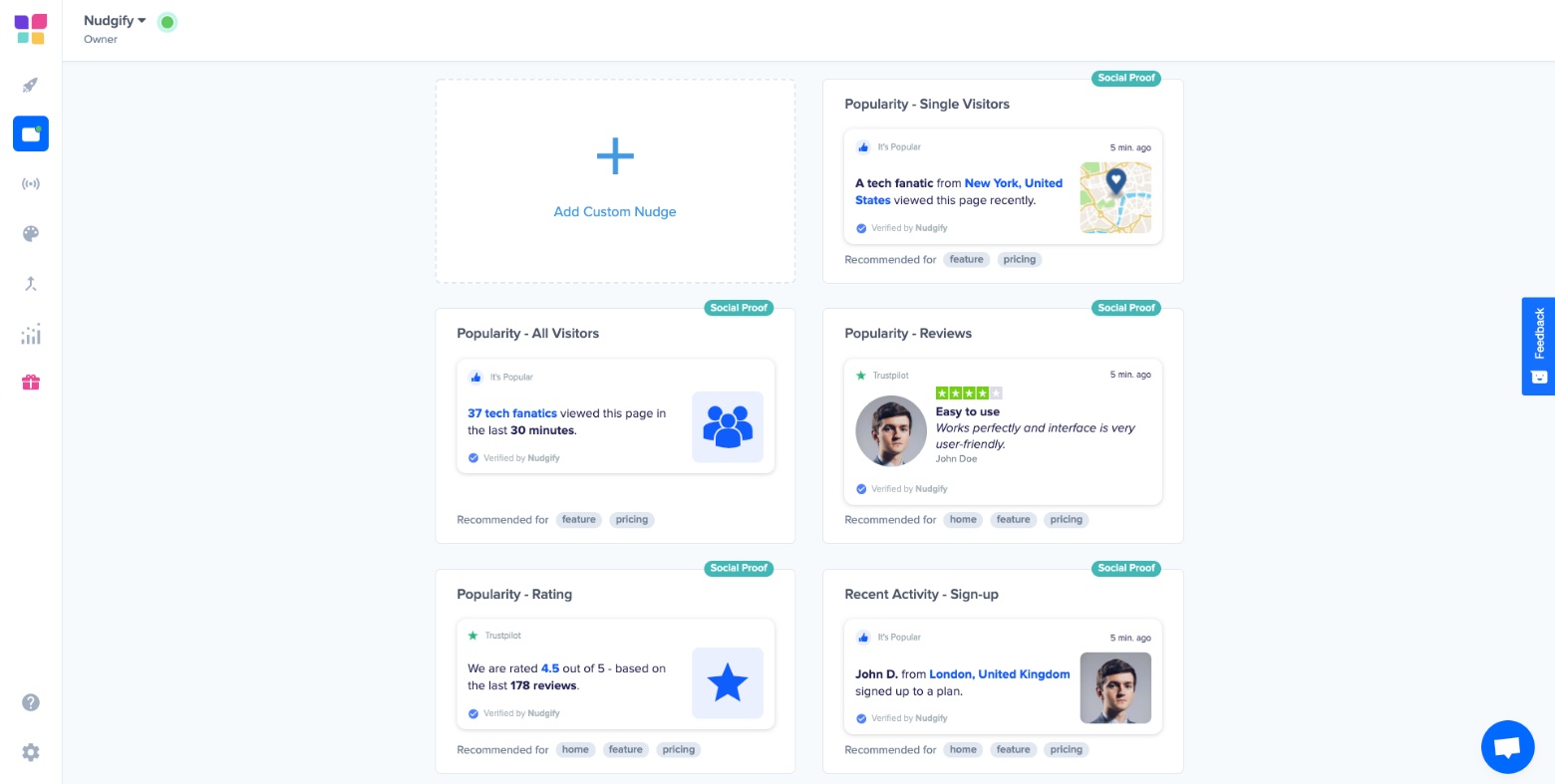
Adding Nudgify to your website is easy, and it allows you to show user activity from almost any other app (including Mailchimp, WooCommerce, Trustpilot…) You can create real Social Proof notifications based on all kinds of customer engagement, and customers know for certain that they can trust them.
Some of the most successful campaigns in history have been built on telling the whole truth. For example, Avis Car rental ran the “We Try Harder” campaign for over 50 years, improving the company’s market share by 7%. The ad’s secret was its honesty about being the industry’s second-biggest name.
When you’re only No. 2, you try harder. Or else.
Social Proof lets you create a real connection with your customers, building long-term trust and recurring revenue. You can’t do that with fake Social Proof.
